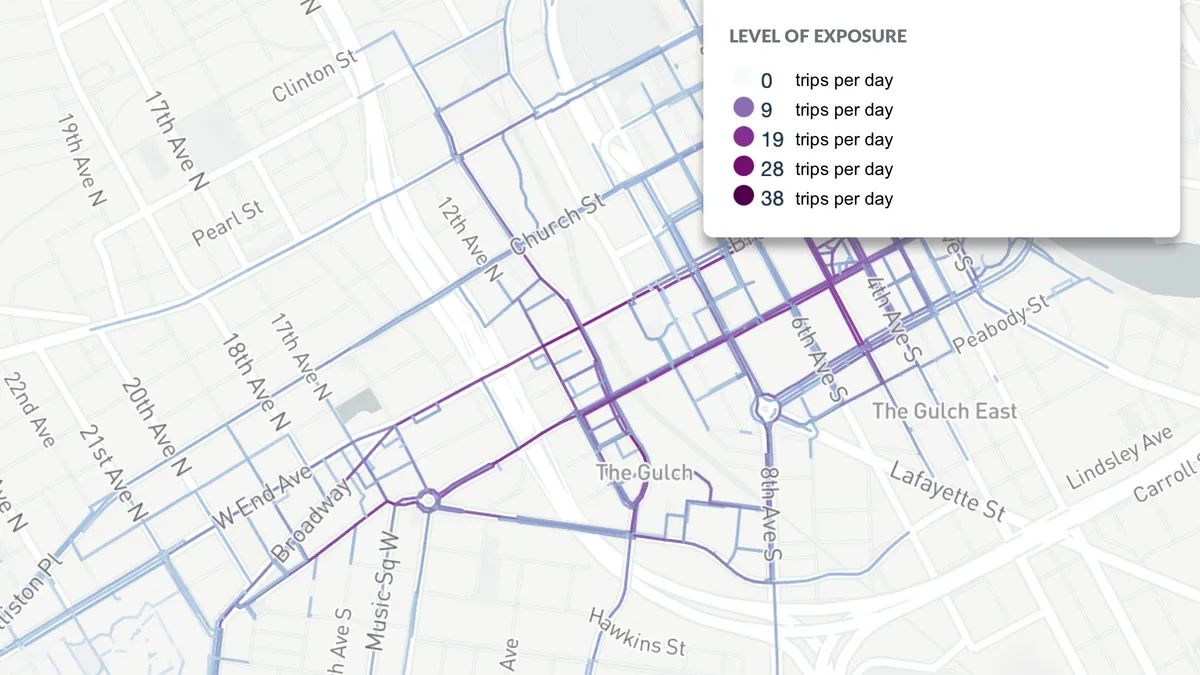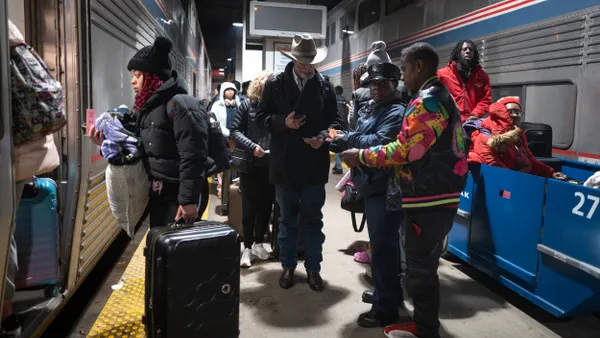Dive Brief:
- The U.S. Department of Transportation (USDOT) has issued contract awards to four vendors tasked with leveraging data to help address the country's "most pressing and persistent surface transportation safety problems."
- The contract awards follow a Broad Agency Announcement (BAA) declaring the Office of the Secretary of Transportation's (OST) interest in utilizing data to gain actionable insights into four transportation topics: precursors to crashes; pedestrian and bicyclist safety; intersections; and non-fatal injury crashes. These insights will be utilized to inform decision-making within the USDOT's Safety Data Initiative (SDI).
- The concept development contracts were issued to micromobility data management platform Populus ($48,200), accounting firm KPMG ($49,900), tech consultancy firm Bytecubed ($49,300) and the Regents of the University of Michigan ($50,000). Each vendor will have until Dec. 27 to develop their concept designs, after which USDOT will select vendors to award follow-on contracts.
Dive Insight:
The federal SDI program was launched in 2018 to enhance U.S. road safety efforts by "strategically prioritizing and addressing transportation safety risks through data-informed decision making," with a focus on three areas: data visualization, data integration and predictive insights. USDOT says it has conducted a number of pilot projects to identify safety challenges since the creation of SDI, and has organized two Safety Data Forums to share progress on these initiatives with stakeholders.
U.S. Transportation Secretary Elaine Chao has heavily prioritized the use of data and new technologies to address transportation safety during her time in office. Chao has pushed the advancement of the Partnership for Analytics Research in Traffic Safety (PARTS) to gather performance data on advanced driver-assistance systems (ADAS), and has also supported the launch of an interactive autonomous vehicle (AV) tracking tool from the National Highway Traffic Safety Administration (NHTSA).
In 2019, Chao even announced the creation of the Non-Traditional and Emerging Transportation Technology Council (NETT) to ensure modal silos at the DOT can interact and support emerging technologies.
Pedestrian deaths in 2019 hit a 30-year high of 6,590 fatalities, according to the Governors Highway Safety Administration (GHSA). Experts at the time blamed a lack of safe infrastructure and technologies for the stark fatality numbers, which suggests the federal government's role in analyzing transportation safety data can be a critical driver of national regulations to enhance infrastructure and protect pedestrians and cyclists.
"I think it's being able to use our collective expertise together that is exciting," Stephanie Seki, mobility partnerships manager at Populus, said in an interview when discussing the contract awards. Seki said Populus will take the next three months to sort through its existing data sources, including its representative survey data of 18 major metro areas, and decipher ways to integrate that data with new sources that can further address emerging safety risks.
Populus is of course no stranger to data collection and analysis, and even unveiled a mobility data sharing guide in May to assist cities and private operators in effectively sharing data and managing curb space. Seki said she hopes this partnership with USDOT will in turn help Populus understand how to better utilize its own data in a matter that can support more broad safety efforts.
Following this "phase one" part of the BAA, the OST anticipates awarding up to three vendors for follow-on, firm fixed-price contracts valued up to $400,000 each for a 12-month period. This "phase two" will be an extension to support the development of concepts created by the end of December.
The BAA contract specialist did not respond to requests for comment in time for publication.
This partnership was announced on the same day that transportation analytics firm INRIX released a report examining the utilization of COVID-19 streets programs in five U.S. cities: Minneapolis, New York, Seattle, Oakland, CA and Washington, DC. This study utilized "trillions of anonymous location-based data points" to address safety across these cities, illustrating one of the many ways data can be leveraged to examine public behavior and trends.











